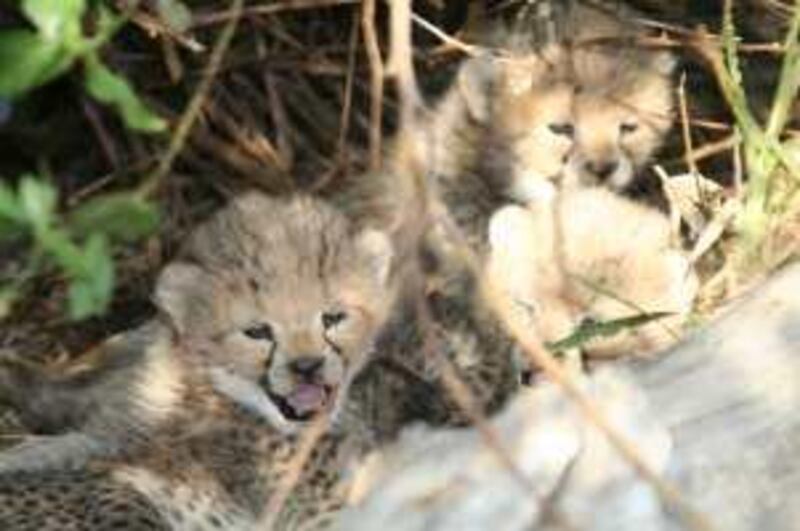The three-and-a-half-week-old cheetah in the plastic box would not have many days ahead if nature had its way. Its mother had run dry of milk, a common occurrence in cheetah females who are left with only one cub to feed. But since the cub was born at a private park in Dubai rather than in the African plains or the Iranian desert, its life was saved. As the creature waited to be fed kitten formula, its occasional soft cries were drowned in the noisy chatter of its roommates - newly hatched flamingos also being tended to by staff at the Sheikh Butti bin Juma Al Maktoum Wildlife Centre.
Cheetahs, the fastest mammals, are a dying breed; the known population is not much greater than 7,000. According to the Red List of Threatened Species, maintained by the Swiss-based International Union for Conservation of Nature, cheetahs have disappeared from 76 per cent of their historic range in Africa. In Asia, where the animal was hunted extensively and sometimes collected as pets, it has "lost almost all its vast historic range, which within the last century extended from the shores of the Mediterranean and the Arabian Peninsula, north to the northern shores of the Caspian and Aral seas, and west through Uzbekistan, Turkmenistan, Afghanistan, Pakistan into central India".
The last wild cheetah in Arabia was shot in Oman in 1977, said Sean McKeown, the man in charge of breeding the rare animals at the wildlife centre. The region's only remnant cheetah population is in Iran, he said, and that too is in jeopardy because the number of wild animals is too small to sustain genetically diverse growth. To save them, scientists have started to raise cheetahs in captivity. This is why the furry tabby-grey creature in the plastic box was being fed by Mr McKeown. In nature, he said, the destiny of an individual creature would not be as important to the survival of a species as a whole.
"Because of predation from other carnivores such as lions and hyenas, only 10 to 15 per cent of cheetah youngsters survive in nature in East Africa," Mr McKeown said. Raising a litter is a two-year effort for a mother, so any female cheetah needs to start with a large litter if at least some of the youngsters are to reach maturity. If the mother suddenly finds herself with only one cub to tend, her milk may run dry. The cub will die so the mother can mate and give birth again.
By the time Mr McKeown completed his explanation, the cub had gulped down the milk and was burping, its tiny belly swollen with food. The youngster had not been given a name, said Mr McKeown, partly out of a conviction not to attribute human-like qualities to creatures that belong to the wild and partly because a large number of cheetahs had been born at the centre since he arrived there in 1995. At present, the centre has 27 cheetahs, including five born this year. Around 100 have been bred so far, 40 of them given away to zoos, in Europe as well as in Riyadh and Qatar.
Mr McKeown advises the Namibia-based Cheetah Conservation Fund and is also European cheetah species co-ordinator for the north African cheetah, which is rarer than its south African cousin. While fewer than 200 individuals of the former live in captivity, the latter has a captive population of well over 1,000. Could the cheetah be introduced back into the wild in the UAE? One thing that works in the cheetah's favour, Mr McKeown said, is that it is rarely a danger to people. But any reintroduction would require a stable population of gazelles for the animals to feed on. One possibility could be to introduce cheetahs in wildlife parks and protected areas where they would serve the role of population control, killing off the sick and weak animals and some young.
"Hopefully it will be something we can do in future," Mr McKeown said. vtodorova@thenational.ae






